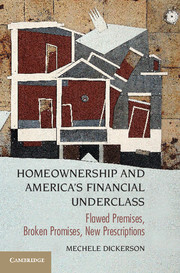 Homeownership and America's Financial Underclass
Homeownership and America's Financial Underclass Book contents
- Frontmatter
- Dedication
- Contents
- Acknowledgments
- 1 Chasing the American Dream
- 2 The Happy Homeownership Narrative
- 3 U.S. Support for Homeowners
- 4 The Homeownership Crisis
- 5 Homeowner Harm and the Blame Game
- 6 Flawed Premises
- 7 The Burden of Home Buying While Black or Latino
- 8 The Benefits of Home Buying While Black or Latino
- 9 Homeownership: Educational Disparities
- 10 Homeownership: Income Disparities
- 11 Outlook and Prescription for the Future
- Index
- References
9 - Homeownership: Educational Disparities
Published online by Cambridge University Press: 05 July 2014
- Frontmatter
- Dedication
- Contents
- Acknowledgments
- 1 Chasing the American Dream
- 2 The Happy Homeownership Narrative
- 3 U.S. Support for Homeowners
- 4 The Homeownership Crisis
- 5 Homeowner Harm and the Blame Game
- 6 Flawed Premises
- 7 The Burden of Home Buying While Black or Latino
- 8 The Benefits of Home Buying While Black or Latino
- 9 Homeownership: Educational Disparities
- 10 Homeownership: Income Disparities
- 11 Outlook and Prescription for the Future
- Index
- References
Summary
Americans list inadequate education and financial insecurity as two obstacles that prevent them from achieving the American Dream. As discussed in the last chapter, ongoing discrimination and the vestiges of redlining and steering continue to lower black and Latino homeownership rates. Past and present discriminatory practices and biases also make it harder for blacks and Latinos to buy high-appreciating homes with lower-cost financing. But racism alone does not explain why homeownership continues to be so elusive and fleeting for black and Latino households, why owning homes has not helped them close the racial wealth gap, and why the racial homeownership gap between whites and minorities has essentially remained the same for the last thirty years.
Most blacks, Latinos, and low- and moderate-income (LMI) Americans have had stagnant income for almost three decades, and they have been unable to consistently pay their bills – much less save enough money to make a down payment on a home. In sharp contrast, the top 10 percent of earners in the United States have received increasingly larger shares of the total income earned by workers in the United States, and these highly paid (and almost always college-educated) workers have amassed enormous wealth.
The racial homeownership gap persists and the income and wealth divide is widening principally because of the enormous gap between the earnings of college-educated workers and workers who do not have college degrees. Unless the United States finds a way to close the K–12 and college educational attainment gap, black and Latino homeownership rates will always lag white rates, and the homeownership rate for LMI Americans will continue to lag the homeownership rates of the highest-paid Americans.
- Type
- Chapter
- Information
- Homeownership and America's Financial UnderclassFlawed Premises, Broken Promises, New Prescriptions, pp. 206 - 230Publisher: Cambridge University PressPrint publication year: 2014


